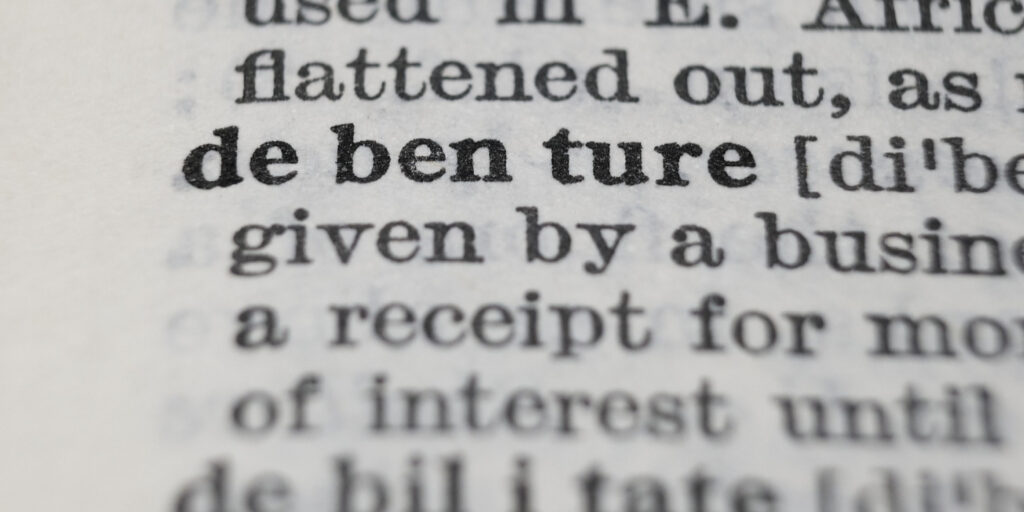A debenture is a formal agreement that secures a lender’s funds against the borrower’s assets to ensure that the interest is paid, and the loan returned. It is a debt-acknowledging document between a business and a lender.
Businesses of all sizes can use debentures, but small companies often use them for financial aid in the start-up phase to get things off the ground. Perhaps you need revenue for a new marketing campaign, or maybe you need to buy a new office space – no matter the purpose, debentures are a popular loan instrument that offers security for lenders and tax benefits for borrowers.
In this post, we will explore the ins and outs of debentures. We will cover what they are, how they’re used, their pros and cons, and how to register a debenture as a company owner.
What is a debenture?
In simple terms, a debenture is a debt-collecting instrument. It is a formal, asset-backed agreement between a lender and the borrower. This means that, in the event of a default or if your business goes into liquidation, the loan is secured against your company’s assets.
To provide this security, debentures are registered at Companies House. A typical agreement normally includes the following details:
- The loan amount
- The term length
- Interest rate (including how much and how often the interest should be paid. This can be fixed or flexible)
- Repayment date (this can be a fixed date or on demand)
- Type of debenture charge
- Terms and conditions
Charge types
There are two charge types: fixed and floating.
Fixed charge
In a fixed-charge debenture, security is taken against the borrower’s specific assets. This is normally a larger, durable item like land, property, or plant and machinery. It is normally a fixed possession that is not regularly traded.
A fixed charge doesn’t change the legal ownership of the asset in question, but if you (the borrower) want to buy, sell, or make any other trades with it, you’ll need to get the lender’s permission first.
For example, let’s say a bank has a fixed-charge debenture against your limited company and your business premises are the collateral. If you want to sell the property before the debt is repaid, the bank will need to give consent before you can do so.
If you fail to comply with your debenture terms, the lender can appoint an administrator to take control of and sell the asset to collect the debt.
Floating charge
Rather than being attached to specific collateral, a floating charge ‘floats’ over a group of assets. These are typically smaller, short-term possessions that are regularly turned over by a business, like stocks and raw materials. You can find more details on floating charge assets on the GOV.UK website.
This is a more flexible charge option than a fixed one. It’s normally suitable for small or micro companies with limited capital, allowing them to continue trading the assets in question as needed by the business, without any immediate restrictions.
However, floating charges could crystalise. This means that at the point of a pre-agreed event, or if the agreement terms are breached, the charge freezes into a fixed charge.
Can you have multiple debentures?
Yes, you can. A company can have more than one debenture from separate lenders over its assets.
If you have a fixed and floating charge at the same time, the fixed charge has the right to be paid first. If you have more than one of the same charge type (for example, two fixed charges from different lenders), they should be repaid in the order they were created.
In the event of multiple debentures over the same assets, the lenders use what’s known as Deeds of Priority, to work out who should be repaid first. Priority is typically dictated by the date of creation.
Who provides debentures?
Financial lenders, agents, or creditors (like banks or investors) normally use debentures. They can only be issued to limited companies or limited liability partnerships – sole traders or standard partnerships cannot use debentures.
Company owners can also use them to lend their personal funds to their businesses. This is often a more tax-efficient option as the interest is tax-deductible.
Why are debentures used?
Lenders use debentures to offer security over the loans that they issue. If a limited company has a debenture from one lender and an unsecured loan from another, the debenture generally takes top priority. This gives lenders the reassurance that the money will be repaid.
For limited company owners, debentures are also an advantageous option. If you need to cover a new expense (like equipment or a project), you can use a debenture without taking the money out of your company’s cash flow. Also, as mentioned above, you can get tax relief on the interest earned.
Pros and cons for the borrower
There are several reasons why company owners opt for debentures, such as:
- They can help you secure long-term funding without taking money out of your company.
- They don’t require you to give away any shares in your company, so equity is not diluted.
- You can get tax relief on the interest payments, reducing your Corporation Tax bill.
- They typically come with lower interest rates than other loan types, making it cheaper to borrow.
- Their interest rates are fixed, making it a useful financing option during high inflation.
However, there are some points to consider as well:
- They don’t tend to offer exit options, which could stall your company’s growth.
- Debentures don’t offer any repayment flexibility, especially if the terms are based on an on-demand repayment.
- You need a suitable business credit score, which may be difficult depending on how new your company is.
- They pose restrictions on your company’s assets. Fixed charges take away your control over the assets in question if the debt is not repaid, and the lender has the power to appoint an administrator to run your business and realise its assets.
Pros and cons for the lender
Creditors may choose to enter a debenture for the following reasons:
- They are secure loans registered at Companies House.
- They take priority for repayment in the event of insolvency.
- Their fixed rates offer a passive income option.
On the other hand, some of the cons include:
- Due to their fixed rates, the returns could be diminished by high inflation.
- There could be a high risk of default if the borrower doesn’t have a trusted credit rating.
- There is a risk of liquidity as returns are only gained in a specific situation. For example, when the debenture matures.
Debenture registration
Once a debenture is issued, your company is responsible for registering it with Companies House using an MR01 form.
You can register by post or online using your WebFiling account. You’ll need to do this within 21 days of the debenture start date. If you exceed this time frame, you’ll need to file a court order to register the charge instead. It’s important to note that failure to register within the required timescale can have serious consequences, such as the debenture security being voided.
- Where can I get a Certificate of Good Standing for my limited company?
- The pros and cons of operating as an LLP
- How to close a limited company with debts
Depending on the charge type, you will need to provide Companies House with a certified copy of the asset used as collateral. For example, if it’s a mortgaged property, you need to include the mortgage deed in your registration form.
The certified copy will then be published on your company’s public record. So, Companies House advises to redact any personal information from it, such as:
- Any personal information relating to an individual (but not their name)
- The number or identifier of the bank or securities account
- Signatures
Finally, you need a company authentication code. If you don’t already have one or need to request a reminder, you can do this through your WebFiling account. It’ll be sent to you by post within 5 days. You can find more guidance on this on the GOV.UK website.
Registration cost
There is a fee for registering a debenture. If you do this by post, it’s £24, but if you register online, you’ll pay a reduced cost of £15.
The online process is the quickest and most efficient way to do this, and there are built-in checks to help you file correctly. Otherwise, Companies House will contact you if they need more information, or permission to make a correction in your form.
What happens when a debenture is paid off?
This is known as a ‘satisfied’ charge. It is not essential to notify Companies House of a satisfied charge, but it is advised to make sure that your company’s public record is updated accordingly. You can do this via an MR04 form.
This information remains on the public record, even after the charge is satisfied.
Wrapping up
There are many advantages of debentures for limited companies and limited liability partnerships – the main one being the tax benefit. However, if you’re considering getting a debenture for your company, you should be aware of the pros and cons and how it could impact your business.
We hope this guide was useful in understanding what debentures are and how to register them. If you have comments, please post them below, or share this article with someone who you think will find it helpful.
Please note that the information provided in this article is for general informational purposes only and does not constitute legal, tax, or professional advice. While our aim is that the content is accurate and up to date, it should not be relied upon as a substitute for tailored advice from qualified professionals. We strongly recommend that you seek independent legal and tax advice specific to your circumstances before acting on any information contained in this article. We accept no responsibility or liability for any loss or damage that may result from your reliance on the information provided in this article. Use of the information contained in this article is entirely at your own risk.














Join The Discussion